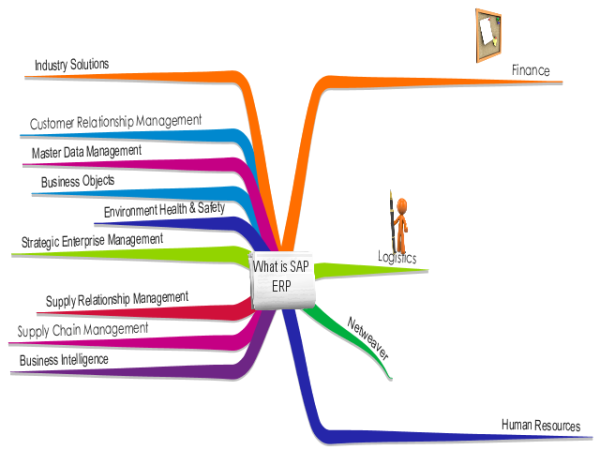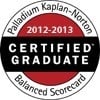SAP Module Mindmap
I frequently get a very interesting question from some of the most senior level executives in the industry when manning the "booth":
What exactly is SAP?
Sometimes They Need to Know What Are SAP Modules
Sometimes they may even have SAP installed and not really know “what’s in the box”.
Whose fault is this?
As a Senior SAP Project Manager, I have to say it is our fault, the SAP consultants, for not simplifying and clarifying what SAP is. We will dive into what it does in another series of blogs later on.
To make understanding SAP Modules simple, I have created a mind-map of the SAP system, which is based on the SAP architecture documentation, and a great deal of general system knowledge gained over the years.
Does Not Include SAP Partner Offerings

This is not a complete picture of the offering either, as I have left out the SAP partner offerings, which are another universe in and unto themselves.
Doing a quick walk-through, starting with finance and proceeding clockwise (sorry for those who only know digital watches:). The SAP Enterprise Resource Management (ERP) System consist of a series of fully integrated SAP modules, which, for example, immediately reflect the impact of a purchase order on a company’s financial status.
-
Finance Module: Includes such sub-modules as Financial Accounting, Controlling, Investment Management, Asset Management and Treasury Management
-
Logistics Module: Includes Sales and Distribution, Materials Management, Warehouse Management, Product Lifecycle Management, Production Planning
-
Human Capital Management: All SAP modules required to define an organization, recruit, hire and manage human resources.
-
Netweaver: The underlying technology platform that SAP operates on, as well as SAP Business Warehouse (sort of).
-
Supply Chain Management (SCM): Originally understood to be SAP APO or Advanced Planner and Optimizer, now includes, via integration, many parts of the logistics system.
-
Customer Relationship Management (CRM): Includes modules for Sales, Service and Marketing and call center management, integrated with Sales and Distribution.
-
Master Data Management: Really a suite of tools designed to manage the entire lifecycle of your Master Data (Customer Data, Product Data, many others).
-
Strategic Enterprise Management: Though somewhat supplanted by Business Objects Business Planning and Consolidation (BPC), includes Business Planning and Simulation (BPS), Balanced Scorecard (Balanced Scorecard), Stakeholder Relationship Management (SRM), Management Cockpit and Business Consolidation (BCS).
-
Business Warehouse (BW): Includes everything you need to build a datawarehouse and reporting solution, including ETL (Extract, Transform, Load, Staging Tools, Metadata Management, Modeling, and Query and Reporting Tools)
-
SAP HANA: Includes everything you need to build a big-data data warehouse (up to 196 terabytes in ram) and reporting solution, including ETL (Extract, Transform, Load, Staging Tools, Metadata Management, Modeling, and Query and Reporting Tools).
SAP HANA is a 3-part solution consisting of SAP HANA, Data Services and Business Intelligence (BI) and comes in 2 flavors: BW on HANA for existing BW systems and Native HANA for greenfield implementations. -
SAP Industry Solutions: More than 30 Industry specific solutions and numerous partner Industry Solutions, including MRO (Maintenance Repair and Overhaul), Real Estate Management, Well Drilling, Legal Services, Poultry and Dairy, DFPS (Defense Industry & Public Security) among many.
-
S/4 Hana: The new Cloud based full SAP ERP system, subscription basis.
As you can see, there is a lot to know to really understand all the different SAP modules available. Knowing what solutions can be realized from these various SAP modules, Industry Solutions, SAP Partner Offerings and via developments, is the role of the SAP Solution Architect.
Which Module Should You Learn?
People ask us all the time, "which sap module is the best sap module" or what is the "most widely used sap module" or "which sap module is in demand in the USA"?
That depends on you and your background.
The real question is not "which is the most popular sap module" in the marketplace but rather how does your background fit with "which module is the best fit" for you personally.
Which ever module you choose because all sap modules are massive in scope and capabilities, you will spend the next 5 years studying just to become barely or marginally functional in that module.
Since SAP ERP is a fully integrated system, the frequency of one module is equal to any other module, which module is the most popular can not be answered because that depends on you and your background.
If you have an engineering degree with no courses in accounting and you are trying to shoehorn yourself into the finance module because you heard that module pays the most money then that may not be a best fit for you.
Whatever module you decide to specialize in, once you get into the market, you'll want to be able to answer the question "What's Your Rate".
Use Our Consulting Rate Calculator To Figure It Out
Our new Consulting Calculator helps you compute the salaries behind SAP Consulting Jobs.
This is useful for:
-
SAP Recruiters
-
Career Changers.
Want to Know How To Understand SAP Business Process?
You start by understanding the basics of SAP. We will address some of the specific business processes supported in another blog (or 10).
If you want a simple way to understand SAP R/3, then you can download the mindmap we've built just for you.
People who read this article also read:
- How You Can Estimate a SAP BW Project in Under 5 minutes
- How to Shape an IT Strategic Plan
- SAP Project Management
- SAP BW Project Management
- Execute Your SAP Projects Better, Cheaper, Faster
- SAP BW Tutorial Best Practice on Project Charter
- SAP BusinessObjects BI 4 Advanced Analysis Demo
- Understanding the most common SAP Data Warehousing Concepts
- Can SAP BW Uncover Free Money?
- How to use a Project Charter to Start a Project
- Understanding SAP Consulting Rates
About SAP BW Consulting, Inc.
SAP BW Consulting, Inc. helps businesses unlock shareholder value through data-driven decision-making. We specialize in SAP Business Intelligence (BI) solutions, including SAP Business Warehouse (BW) implementation, SAP ABAP development, and SAP project management. Our expertise also extends to Salesforce and HubSpot integrations, helping businesses manage complex environments. Additionally, we offer Balanced Scorecard consulting to optimize strategic planning.
Unlock the full potential of your data and drive value. Book a meeting with us today.





